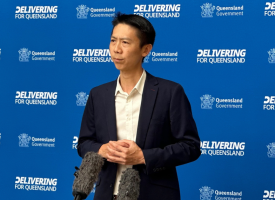Medicare inequities impacting women's health
Medicare rebates have not kept up with the cost of providing services and this is particularly prevalent in services that pertain to women, AMA Queensland President Dr Maria Boulton has told ABC Radio Gold Coast. "When you're talking about the rebate to have an IUD put in, it's only $75, and the actual cost of the procedure is in the hundreds. Women have to pay such large out-of-pocket costs just to have access to what is the gold standard in contraception."

Transcript: AMA Queensland President, Dr Maria Boulton, ABC Gold Coast, Drive with Julie Clift, Friday 5 April 2024
Subject: Gender inequity in Medicare rebates
JULIE CLIFT: Women's health specialists around the country say gender bias in rebates for medical procedures is costing women more and more money. Many in the industry are calling for an urgent gender review of the Medicare Benefits Schedule. They allege that there's an inequality in how procedures are subsided for women compared to those provided for men. I wonder if this is something you're noticing when going for a medical procedure. Queensland's Medical Association President Maria Boulton joins you now. Good afternoon.
DR MARIA BOULTON: Good afternoon Julie.
JULIE CLIFT: Describe these concerns around inequality in rebates.
DR MARIA BOULTON: Yeah, there's a few issues. We all know that Medicare rebates have not kept up with the cost of providing the service and people are having to pay higher out-of-pocket expenses because of that. There are particular rebates that pertain to women that really are way behind from where they should be.
One that's used a lot is the antenatal visit rebate, which sits at about $44. When you consider the fact that those appointments are normally a long appointment, not a standard appointment, and when you compare it to the rebate for a long appointment which is $80, you can see how far behind that one is.
The other one was we had the Government triple the bulk billing incentives last year, and unfortunately they only tripled it for certain consultations and they left out the antenatal consultations, and they also left out mental health consultations, which we know both men and women use. So there's a lot of room to be made in those rebates so that women can continue to have that access to those services.
JULIE CLIFT: I want to talk more about some of the procedures or consultations which are more costly for women in just a moment. But just back to the Medicare rebate. How does a Medicare rebate work, Maria Boulton?
DR MARIA BOULTON: So, when you see a health professional, for example, I'm a GP and when you see a GP like myself for a standard consultation which averages about 10 to 15 minutes, the Government will give you a rebate to help you cover that cost. And sadly those rebates haven't increased a lot over the last two decades, and they haven't kept up with the cost of providing the service, which is why people are now faced with out-of-pocket expenses because the GPs and the practices cannot afford to just exist on those rebates alone. Practices face a choice - do I close my doors or do I charge an out-of-pocket expense, which is normally what we do so that we can continue to provide the service. But when you compare it with the cost of providing those services, they are really far behind where they need to be.
JULIE CLIFT: So again, that's speaking overall as to how things are working, but particularly if we drill down into what's going on when it comes to procedures that are more costly for women or consultations. You've spoken of antenatal consultations What else? What's an example of a procedure which is more costly for women?
DR MARIA BOULTON: Something that's really important for women is contraception. And when you look at the gold standard in contraception, it's actually the long-acting reversible contraceptives, such as the contraceptive rod that goes into your arm or the intra-uterine device that gets inserted into your womb. And for those procedures, the rebates are woeful.
When you're talking about the rebate to have an IUD put in, it's only $75, and the actual cost of the procedure is in the hundreds. Women have to pay such large out-of-pocket costs just to have access to what is the gold standard in contraception. When you look at the rod in the arm, the rebate is only $33, which is once again really poor when you're thinking about the importance of supporting women to have control over when they want to have babies or not.
I wonder whether there's been real thought placed into the actual rebates when it comes to those two, considering how important they are, and considering that they are the gold standard. Certainly they're nowhere near the cost of where they should be, and it makes it difficult for women to access those, particularly at the moment when the Productivity Commission have said that more than ever people are putting off seeing their doctor due to cost pressures. That is a disaster because we know that access to GPs is what people need to stay healthy and stay out of hospital. Without that access, people end up in hospital, which costs everyone a lot more money. And nobody wants to be unhealthy and be sick. Everybody wants to do everything possible to prevent disease. And where is the government in this in ensuring that people have that access to their GP so that they can do that?
JULIE CLIFT: And interesting when you then also, as you were talking there about contraception procedures for women, for example, IUD insertions, you compare that to what rebate is given to a vasectomy, then you can see the real differences between what women are paying or what women are getting back, as opposed to what men are getting back. They're getting much more of a rebate for a vasectomy.
DR MARIA BOULTON: Yes, absolutely. And to be fair, they are different procedures. But considering the importance of both when it comes to family planning, it's nonsensical to not provide more rebates so that people can have free access to those.
They are complex procedures, both of them. I used to insert IUDs and remove them and I undertook many years of training in order to do that. They're not simple procedures, they take a long time to do and often, say for an IUD, you can't do it on the one visit. It's normally spread over three visits. On the first visit, you explain the options to women and then a woman will choose what they want. On the second visit, you'll insert it, and then you'll need a review visit to ensure that everything is okay. So it does add up when it comes to cost.
JULIE CLIFT: What of what has been cited in an ABC news story about this idea of inequality when it comes to rebates for women's procedures about two different procedures which this practising obstetrician in Victoria says they compare to each other, but rather the female internal pelvic ultrasound compared to scrotal ultrasounds, she says, is another example where again women receive less of a rebate as opposed to men when they have a scrotal ultrasound. She says that a pelvic ultrasound is more labour-intensive. What do you say to that?
DR MARIA BOULTON: Once again, isn't that interesting, particularly when pelvic ultrasounds are so important. We use them to diagnose and rule out other causes of pelvic pain when we're looking for endometriosis. We use them to date and locate pregnancies. We use them to look at ovarian issues. It's a very common ultrasound.
Once again, it's one of these issues where the cost of providing the services goes up as cost does over time, as does our house, petrol, electricity, all of those things, but the rebates just remain very, very stagnant. The gap between the cost of providing the service and the rebate just keeps growing and then you're asking the patients to pay for that gap. At a time where we know that cost pressures are biting, to ask a woman to put off a pelvic ultrasound - when we don't order them willy nilly, we order them because we're looking for something or we want to rule out something, it's medically necessary - it's really unfair.
JULIE CLIFT: What of what is being called for by some women's health specialists, which is that they're asking Health Minister Mark Butler to establish a gender-focused review of the Medicare Benefits Schedule. Would you support that, Dr Boulton?
DR MARIA BOULTON: Most definitely. And we are calling for it to go broader than that, because we know that the Medicare rebates aren't where they need to be. We know that people are facing more and more gaps. I don't want Australia to end up with a two-tier health system where some people can afford care and some people can't. I grew up in that sort of system and it just doesn't work.
We want more investment into general practice, we want more investment into mental health, like other countries do. For example, in the Scandinavian region, they invest a lot into general practice and people's access to their GP, and they've actually seen a reduction in the need for hospitals because people are healthier and well. It is an investment. The government may say it's costly, but actually it is an investment because you're investing in people's health, and that investment pays when people don't end up in hospital and when people end up leading better and healthier lives.
JULIE CLIFT: Really good to speak with you this afternoon, Dr Boulton. Thank you for joining me.



